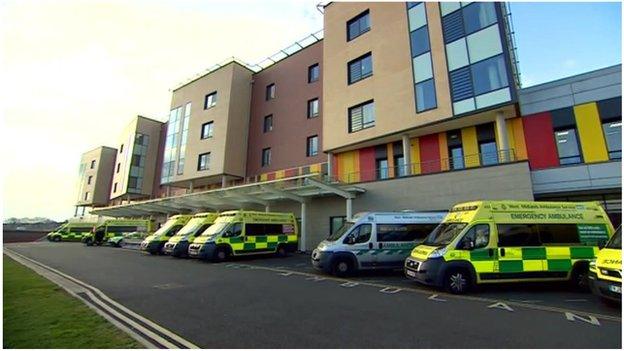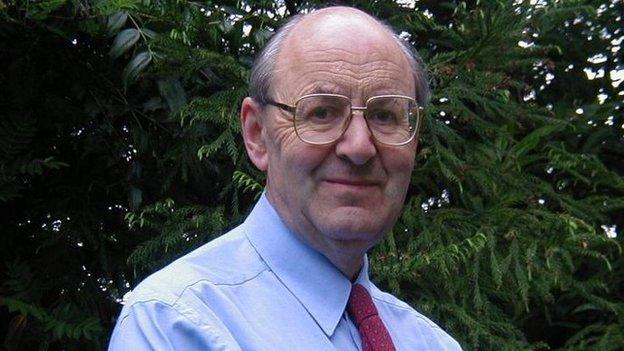Politics can damage your health in needle elections
- Published
- comments

The Royal Stoke was one of several hospitals in England to declare a "major incident" earlier in the month
As the pre-election tension mounts, so do the stress levels of the election strategists, contemplating parts of the country like ours, famous for our marginal or "swing" seats, which can have such a significant bearing on the outcome.
The converse is equally true: Health can damage your politics.
A hospital issue can cut clean through and across general and local elections and turn conventional calculations upside down.
Labour has put the NHS at the centre of its campaign.
A recent poll by Lord Ashcroft suggested it is now the most important issue on the doorstep. And the Conservative former Chancellor Nigel, now Lord, Lawson has said the health service is the nearest thing we have to a national religion.
So a midwinter health crisis during the run-up to a general election is the stuff of nightmares for any incumbent government.
'Top down reforms'
Ministers have thrown £700m at our hospitals in the hope of limiting the damage. Hence their insistence that the pressures on Accident and Emergency departments, though serious, do not constitute a crisis.
Any health service in the world would struggle with the demands of a population which, to the great credit of the NHS under successive governments, is generally living so much longer.

Dr Richard Taylor lost his seat in the Wyre Forest to the Conservatives in 2010
By contrast, Labour maintain it is a crisis, made worse by the government's "top down" reforms - driving people to A&E because they cannot get appointments with their GPs. Or because they are sent there by the NHS 111 call centres which were introduced after NHS Direct was scrapped.
The biggest ructions in health politics seem to have developed an uncanny habit of being played out in our part of the country.
Arising out of a hospital scandal that happened on Labour's watch but culminated under the coalition government, the tented protest by Support Stafford Hospital demonstrates yet again how health campaigners' sheer determination, resilience and ingenuity can cut clean through and across conventional political loyalties, and go right to the heart of local communities.
From the encampment in Stafford came a resounding chorus of "we-told-you-sos" when it was confirmed the Royal Stoke Hospital's A&E department, to which Stafford's emergency services transfer overnight, was among the first to declare a "major incident".
An earlier downgrading of Kidderminster District General Hospital in the early years of the Blair government cost the then Labour minister David Lock his seat at Wyre Forest in Worcestershire.
Local landslides in successive general elections propelled that champion of people power, Dr Richard Taylor, to Westminster where he achieved an unprecedented double by serving two terms as an Independent MP.
Having lost his seat to the Conservatives in 2010, he is now attempting a Parliamentary comeback there, this time for the National Health Action Party, who plan to contest dozens of other health hotspots including, inevitably, Stafford.
And yet some of the biggest and most fundamental challenges facing the NHS have so far been conspicuous by their absence from the campaign.

Paying for new treatments is likely to be an ongoing problem for the NHS
Funding deficit
While the UKIP leader Nigel Farage has mooted the idea of switching from a tax-funded system to insurance-based NHS finance, the bigger parties have so far shown little enthusiasm to respond in detail to warnings of a deepening budgetary black hole.
Former Birmingham University professor Chris Ham, now chief executive of health charity the King's Fund, is warning the NHS faces a £30bn funding deficit by 2020.
A shortfall on that scale would go way beyond the scope either of Labour's "mansion tax" or of the Conservatives' commitment to ring fence health spending and increase it in real terms.
More and more high-tech, high-cost, drugs and treatments are becoming available all the time. So the debates about rationing and funding will not go away, whoever forms the next government.
Matching our expectations of the health service with what and how we are willing to pay for it poses immense questions.
The challenge facing our politicians in this election will be deciding how they answer them.
- Published10 January 2015

- Published12 January 2015
